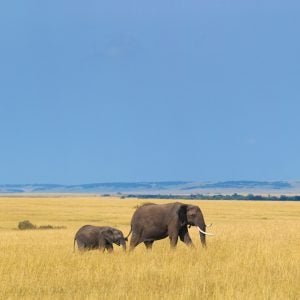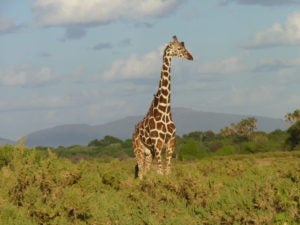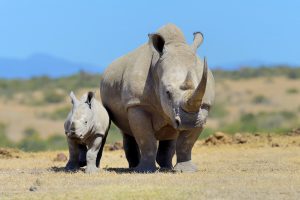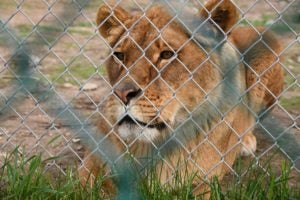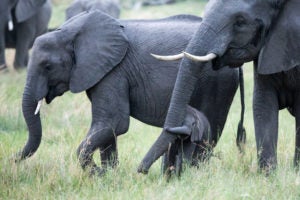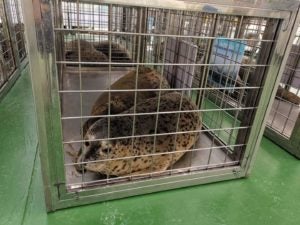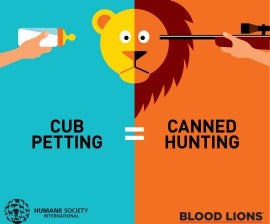BRUSSELS—Alesha Dixon, Martin Clunes OBE, Deborah Meaden, Anneka Rice, Susan George, Virginia McKenna OBE, Brian Blessed OBE, Fiona Shaw CBE, Steve Backshall and Lucy Watson have written to EU Environment Commissioner Karmenu Vella urging him to support a proposal by African nations to protect the imperiled giraffe. The species has declined by up to 40 percent in the past 30 years. The proposal will be discussed at a meeting of the Convention on International Trade in Endangered Species of Wild Fauna and Flora (CITES) in Colombo, Sri Lanka starting in late May, but it has little chance of success without the support of the EU voting bloc.
In an open letter co-signed by the Born Free Foundation, Humane Society International, the International Fund for Animal Welfare, Pro Wildlife, Animal Defenders International, the Natural Resources Defense Council, the Center for Biological Diversity, Animal Welfare Institute, and Avaaz, the stars urge the EU Commission to “stick its neck out for the giraffe” by supporting the of listing the giraffe on Appendix II of CITES.
The letter reads: “The world’s tallest mammal is beloved by many for its beauty and grace. These gentle giants are icons of the African savannah, and every child knows that “G” is for giraffe. But sadly, this iconic species is suffering a “silent extinction” because few are aware of their plight. Giraffe populations have decreased approximately 40% in the last 30 years. If we do not act quickly the giraffe could disappear forever.”
The proposal has been put forward by the Central African Republic, Chad, Kenya, Mali, Niger and Senegal, and is supported by the 32 African nation members of the African Elephant Coalition, which released a declaration last month in recognition of the steep decline in giraffe populations. An Avaaz petition has also received 1.3 million signatures of support from citizens around the world.
Scientists have labeled the plight of giraffes a “silent extinction” due to the lack of attention and support the species is receiving. Securing the support of the voting bloc of EU Member States is absolutely critical for the giraffe proposal to succeed, but as yet the EU is hesitant to support. EU representatives are due to meet and agree their position on this and other proposals on 28th March, so the celebrities and animal groups have come together to increase their call on the EU to act.
Virginia McKenna OBE, actress and co-founder of The Born Free Foundation, said: “The trivial items – giraffe bone handles, a Bible cover, a giraffe foot – made from the parts of dead giraffes – should be objects of shame. The world has gone mad if people value these more than the living, beautiful creatures which play such a vital role in the survival of the African savannah. Animals suffer and feel pain as we do- or don’t we care?”
Singer Alesha Dixon said: “It saddens me to think that our children or grandchildren could grow up in a world without giraffes, so I hope that policy makers do the right thing and support the proposal to protect this beautiful species.”
Adam Peyman, Humane Society International’s wildlife programs and operations manager, said: “The giraffe is going quietly extinct as they are slaughtered for trophies and their body parts used for trinkets. As there are currently no regulations on trade in giraffes, a CITES listing would provide critical measures to ensure giraffes are not pushed to the brink of extinction, and the EU’s vote holds the key to its success.”
Jan Creamer, President of Animal Defenders International, said: “We must act now to prevent the further decline of this iconic species. African nations need our help to protect threatened giraffe populations, and we urge the EU to step up and support this important measure, before it’s too late.”
While giraffe populations continue to wane, the species has become common in the wildlife trade. A Humane Society International report shows that the United States imported nearly 40,000 giraffe specimens between 2006 and 2015, such as hunting trophies, decoration items, and knife handles, in addition to large shipments of live animals. The EU is also a key consumer of giraffe products; online research detailed in the proposal records over 300 giraffe products for sale by sellers based in seven European Union countries: Belgium, France, Germany, Greece, Italy, Spain and the United Kingdom.
The proposal seeks to provide giraffes with protections to bring under control international trade in the currently unprotected species. An Appendix II listing would require exporting countries to prove that giraffe specimens were legally obtained and that the export is not detrimental to the survival of the species. Additionally, the listing would provide researchers and governments with important data to track the trade in giraffes throughout the world.
The nine organisations and the 32 African countries also strongly encourage CITES Parties, the CITES Secretariat, inter-governmental organisations and non-governmental organisations to support the proposal.
Notes to Editors:
- The US, the only country for which import data is available, imported a total of 39,516 giraffe specimens between 2006 and 2015, some of these originating in countries where giraffe populations are Critically Endangered, Endangered, and Vulnerable.
- The 18th meeting of the Conference of the Parties to CITES will take place in Colombo, Sri Lanka, from 23 May to 3 June.
- Members of the Africa Elephant Coalition, which announced support for the giraffe proposal, include Benin, Burkina Faso, Burundi, Cameroon, Central African Republic, Chad, Comoros, Democratic Republic of the Congo, Equatorial Guinea, Eritrea, Ethiopia, Gambia, Gabon, Ghana, Guinea, Guinea-Bissau, Ivory Coast, Kenya, Liberia, Mali, Mauritania, Niger, Nigeria, Republic of the Congo, Rwanda, Senegal, Sierra Leone, Somalia, Sudan, South Sudan, Togo, and Uganda.
- Watch a short awareness video on the giraffe’s silent extinction here.
Media contacts:
Humane Society International (UK): Wendy Higgins, whiggins@hsi.org +44 (0) 7989 972 423
DOWNLOAD: video and photos of giraffe skin, bone and other items sold in the USA for the wildlife trade here.
